| Listing 1 - 10 of 49 | << page >> |
Sort by
|
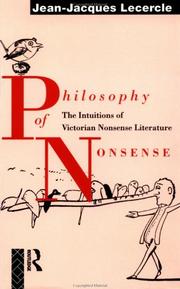
ISBN: 0415076536 0415076528 1138175633 0203025725 128033214X 9780203025727 9780415076531 9780415076524 9786610332144 6610332142 9781134902415 1134902417 9781134902361 1134902360 9781134902408 1134902409 9781138175631 Year: 1994 Publisher: London New York Routledge
Abstract | Keywords | Export | Availability | Bookmark
 Loading...
Loading...Choose an application
- Reference Manager
- EndNote
- RefWorks (Direct export to RefWorks)
'Jean-Jacques Lecercle's remarkable Philosophy of Nonsense offers a sustained and important account of an area that is usually hastily dismissed. Using the resources of contemporary philosophy - notably Deleuze and Lyotard - he manages to bring out the importance of nonsense' - Andrew Benjamin, University of Warwick Why are we, and in particular why are philosophers and linguists, so fascinated with nonsense? Why do Lewis Carroll and Edward Lear appear in so many otherwise dull and dry academic books? This amusing, yet rigorous new
English literature --- anno 1800-1899 --- Littérature anglaise --- --XIXe s., --- Nonsense --- --Carroll, Lewis pseudonyme de Dodgson, Charles Lutwidge (1832-1898) --- Œuvre --- --Langage --- --Philosophie --- --Nonsense literature, English --- 5340 --- History and criticism --- Theory, etc --- 820-7 --- 820 "18" --- Engelse literatuur: humor; satire --- Engelse literatuur--19e eeuw. Periode 1800-1899 --- 820 "18" Engelse literatuur--19e eeuw. Periode 1800-1899 --- 820-7 Engelse literatuur: humor; satire --- Nonsense literature, English --- English nonsense literature --- Nonsense literature, English, [etc.] --- British literature --- Inklings (Group of writers) --- Nonsense Club (Group of writers) --- Order of the Fancy (Group of writers) --- History and criticism&delete& --- --Carroll, Lewis, --- Theory, etc. --- XIXe s., 1801-1900 --- Langage --- Philosophie --- Nonsense literature, English - History and criticism - Theory, etc --- English literature - 19th century - History and criticism - Theory, etc --- Carroll, Lewis, 1832-1898 --- LITTERATURE ANGLAISE --- NON-SENS (PHILOSOPHIE) --- LITTERATURE NONSENSIQUE (NON-SENS) --- 19E SIECLE --- HISTOIRE ET CRITIQUE --- THEORIE, ETC.
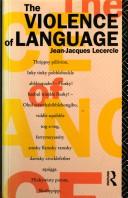
ISBN: 0415034302 0415034310 9780415034319 Year: 1990 Publisher: London: Routledge,
Abstract | Keywords | Export | Availability | Bookmark
 Loading...
Loading...Choose an application
- Reference Manager
- EndNote
- RefWorks (Direct export to RefWorks)
Langage [Sciences du ] --- Langage [théorie du ] --- Linguistic science --- Linguistics --- Linguistique --- Linguïstiek --- Pragmatics --- Pragmatiek --- Pragmatique --- Science of language --- Sciences du langage --- Taalkunde --- Taalwetenschap --- Théories du langage --- Language and languages --- Langage et langues --- Philosophy --- Philosophie --- #SBIB:309H517 --- Verbale communicatie: sociale psychologie van de taal en de interactie, psycholinguistiek --- Lexicology. Semantics --- Pragmatics. --- Linguistics. --- Philosophy. --- Linguïstiek. --- Pragmatiek. --- Taalfilosofie. --- #SBIB:309H518 --- Pragmalinguistics --- General semantics --- Logic, Symbolic and mathematical --- Semantics (Philosophy) --- Verbale communicatie: sociologie, antropologie, sociolinguistiek --- Language and languages - Philosophy.
Book
ISBN: 9782130543886 213054388X Year: 2004 Publisher: Paris: PUF,
Abstract | Keywords | Export | Availability | Bookmark
 Loading...
Loading...Choose an application
- Reference Manager
- EndNote
- RefWorks (Direct export to RefWorks)
Language and languages --- Philosophy, Marxist. --- Dialectical materialism --- Langage et langues --- Philosophie marxiste --- Matérialisme dialectique --- Philosophy. --- Philosophie --- Philosophy, Marxist --- Philosophy --- Matérialisme dialectique --- Language and languages - Philosophy --- Philosophie du langage --- Sciences sociales --- Psycholinguistique --- Sociolinguistique --- Analyse marxiste
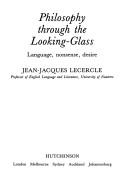
ISBN: 009161371X 9780091613716 Year: 1985 Volume: 2 Publisher: London: Hutchinson,
Abstract | Keywords | Export | Availability | Bookmark
 Loading...
Loading...Choose an application
- Reference Manager
- EndNote
- RefWorks (Direct export to RefWorks)
Languages --- Language. --- Philosophy.
Book
ISBN: 0333686942 Year: 1999 Publisher: New York, NY : MacMillan,
Abstract | Keywords | Export | Availability | Bookmark
 Loading...
Loading...Choose an application
- Reference Manager
- EndNote
- RefWorks (Direct export to RefWorks)
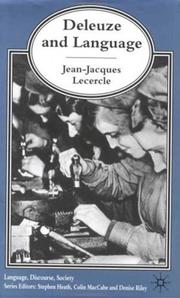
ISBN: 1403900361 Year: 2002 Publisher: Basingstoke Palgrave Macmillan
Abstract | Keywords | Export | Availability | Bookmark
 Loading...
Loading...Choose an application
- Reference Manager
- EndNote
- RefWorks (Direct export to RefWorks)
In the field of philosophy of language, is there life beyond Chomsky? Deleuze's deep distrust for, and fascination with language provide a positive answer - nothing less than a brand new philosophy of language, where pragmatics replaces structural linguistics, and where the literary text and the concept of style have pride of place. This should be good news not only for philosophers, but for linguistics and literary critics as well.
1 DELEUZE, GILLES --- 800.1 --- Filosofie. Psychologie--DELEUZE, GILLES --- Taalfilosofie --- Language and languages --- Philosophy. --- Deleuze, Gilles, --- 800.1 Taalfilosofie --- 1 DELEUZE, GILLES Filosofie. Psychologie--DELEUZE, GILLES --- Philosophy --- Deleuze, G. --- Delëz, Zhilʹ, --- Dūlūz, Jīl, --- دولوز، جيل --- Delezi, Jier,
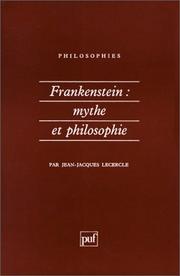
ISBN: 2130418724 9782130418726 Year: 1989 Volume: 17 Publisher: Paris: PUF,
Abstract | Keywords | Export | Availability | Bookmark
 Loading...
Loading...Choose an application
- Reference Manager
- EndNote
- RefWorks (Direct export to RefWorks)
Shelley, Mary W. --- Frankenstein (Fictitious character) in literature --- Frankenstein (Personnage fictif) dans la littérature --- Shelley, Mary Wollstonecraft, --- Frankenstein --- Shelley, Mary --- Frankenstein (Personnage fictif) dans la littérature --- Characters --- Frankenstein. --- Frankenstein, Victor --- In literature. --- Myth in literature --- Philosophy --- CDL --- 82 --- Pharmacy Philosophy --- Philosophical Overview --- Hedonism --- Stoicism --- Overview, Philosophical --- Overviews, Philosophical --- Pharmacy Philosophies --- Philosophical Overviews --- Philosophies --- Philosophies, Pharmacy --- Philosophy, Pharmacy --- Mental philosophy --- Humanities --- LINGUISTIQUE --- SEMIOTIQUE --- DISCOURS
Book
ISBN: 9780748649051 9780748638000 0748638008 0748641637 0748652647 1282749730 9786612749735 Year: 2010 Publisher: Edinburgh : Edinburgh University Press,
Abstract | Keywords | Export | Availability | Bookmark
 Loading...
Loading...Choose an application
- Reference Manager
- EndNote
- RefWorks (Direct export to RefWorks)
Why do philosophers read literature? How do they read it? And to what extent does their philosophy derive from their reading of literature? Anyone who has read contemporary European philosophers has had to ask such questions. This book is the first attempt to answer them, by considering the 'strong readings' Alain Badiou and Gilles Deleuze impose on the texts they read. Lecercle demonstrates that philosophers need literature, as much as literary critics need philosophy: it is an exercise not in the philosophy of literature (where literature is a mere object of analysis), but in philosophy and
Literature --- Deleuze, Gilles --- Badiou, Alain --- Badiou, Alain. --- Criticism. --- Philosophy. --- Deleuze, Gilles, --- Philosophy, French
Book
ISBN: 0748652647 1282749730 9786612749735 0748641637 9780748641635 9780748638000 0748638008 Year: 2022 Publisher: Edinburgh
Abstract | Keywords | Export | Availability | Bookmark
 Loading...
Loading...Choose an application
- Reference Manager
- EndNote
- RefWorks (Direct export to RefWorks)
Why do philosophers read literature? How do they read it? And to what extent does their philosophy derive from their reading of literature? Anyone who has read contemporary European philosophers has had to ask such questions. This book is the first attempt to answer them, by considering the 'strong readings' Alain Badiou and Gilles Deleuze impose on the texts they read. Lecercle demonstrates that philosophers need literature, as much as literary critics need philosophy: it is an exercise not in the philosophy of literature (where literature is a mere object of analysis), but in philosophy and
Literature --- Philosophy, French --- Literature and philosophy --- Philosophy and literature --- Philosophy. --- Theory --- Deleuze, Gilles, --- Badiou, Alain. --- Badiou, Alain --- Badiou, A. --- Badiu, Alen, --- Badiou, Alan, --- Bādiyū, Ālān, --- Бадиу, Ален, --- باديو, آلان, --- באדיו, אלן, --- アラン・バディウ, --- 巴迪欧, 阿兰, --- Deleuze, G. --- Delëz, Zhilʹ, --- Dūlūz, Jīl, --- دولوز، جيل --- Delezi, Jier,
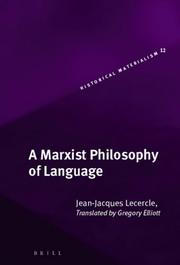
ISBN: 1281396850 9786611396855 9047408489 9789047408482 9004147519 9789004147515 9004147519 9789004147515 9781281396853 6611396853 Year: 2006 Publisher: Leiden Boston Brill
Abstract | Keywords | Export | Availability | Bookmark
 Loading...
Loading...Choose an application
- Reference Manager
- EndNote
- RefWorks (Direct export to RefWorks)
The purpose of this book is to give a precise meaning to the formula: English is the language of imperialism. Understanding that statement involves a critique of the dominant views of language, both in the field of linguistics (the book has a chapter criticising Chomsky's research programme) and of the philosophy of language (the book has a chapter assessing Habermas's philosophy of communicative action). The book aims at constructing a Marxist philosophy of language, embodying a view of language as a social, historical, material and political phenomenon. Since there has never been a strong tradition of thinking about language in Marxism, the book provides an overview of the question of Marxism in language (from Stalin's pamphlet to Voloshinov's book, taking in an essay by Pasolini), and it seeks to construct a number of concepts for a Marxist philosophy of language. The book belongs to the tradition of Marxist critique of dominant ideologies. It should be particularly useful to those who, in the fields of language study, literature and communication studies, have decided that language is not merely an instrument of communication.
Language and languages --- Philosophy, Marxist. --- Marxian philosophy --- Marxist philosophy --- Communism and philosophy --- Philosophy. --- Philosophy, Marxist
| Listing 1 - 10 of 49 | << page >> |
Sort by
|

 Search
Search Feedback
Feedback About UniCat
About UniCat  Help
Help News
News